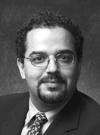Thieme-IUPAC Prize in Synthetic Organic Chemistry for
2008
Announced
Thieme Publishers and IUPAC in collaboration with the editors of
SYNTHESIS, SYNLETT, Science of Synthesis, and Houben –Weyl announce
the recipient of the
2008 Thieme-IUPAC Prize in Synthetic Organic Chemistry
F. Dean Toste
 We
are pleased to announce that the 2008 Thieme IUPAC Prize awardee is
F. Dean Toste of the University of California, Berkeley. As the
9th recipient of the Prize, the awardee joins a select group of scientists
under the age of 40 years whose research has had a major impact on the
field of synthetic organic chemistry. The Prize, which is awarded every
two years and consists of Euros 5000, will be presented to Dean Toste
at his Award Lecture on June 24, 2008, at the ICOS-17
conference in Daejeon, Korea.
We
are pleased to announce that the 2008 Thieme IUPAC Prize awardee is
F. Dean Toste of the University of California, Berkeley. As the
9th recipient of the Prize, the awardee joins a select group of scientists
under the age of 40 years whose research has had a major impact on the
field of synthetic organic chemistry. The Prize, which is awarded every
two years and consists of Euros 5000, will be presented to Dean Toste
at his Award Lecture on June 24, 2008, at the ICOS-17
conference in Daejeon, Korea.
After completion of B.Sc. and M.Sc. degrees at the University of Toronto,
where he carried out research under the guidance of an excellent teacher,
Ian W.J. Still, Dean Toste joined Barry M. Trost at Stanford University
in 1995,where he obtained his Ph.D. in 2000. His Ph.D. thesis received
the prestigious ACS Nobel Laureate Signature Award. Following postdoctoral
research with Robert H. Grubbs at the California Institute of Technology,
Dean joined the department of chemistry at Berkeley in 2002,and was
promoted to Associate Professor in 2006.
Dean Toste 's research is primarily aimed toward the development of
catalysts and catalytic reactions and methods for organic synthesis,
and he has been responsible for a wide range of new discoveries, made
at an extraordinary rate.
His achievements include the almost unprecedented use of a high oxidation
state dioxo- rhenium complex to catalyze reductions of aldehydes, ketones,
and imines, an approach that is contrary to conventional wisdom. Nevertheless,
he went on to elucidate a novel mechanism for the process and developed
a stereoselective version.
Dean Toste 's research has also led to a series of outstanding contributions
in the use of late transition metal complexes in low oxidation states,
most notably gold(I), as catalysts for advanced organic synthesis. The
potential of gold catalysts has been over-looked for decades, and it
is largely due to the excellent achievements of the Toste laboratory
that this situation is now rapidly changing. Dean Toste 's publications
on gold-catalyzed cycloisomerization reactions and sigmatropic rearrangements,
as well as his fine work on the intramolecular Schmidt reaction, to
mention just a few of his contributions, bear witness to his outstanding
creativity. A spectacular recent achievement, which holds considerable
promise, is his insightful approach to stereoselective catalysis using
chiral counterions to the cationic gold template.
These important methodological innovations are complemented by elegant
applications to target-oriented synthesis as highlighted, for example,
by his approach to the cytotoxic alkaloid (+)-lycopladine.
Dean Toste 's development of new methodologies is characterized by
a rational approach rather than by random screening, and is supported
by a deep commitment to understanding the underlying mechanisms of these
extraordinary processes, which sets the stage for further development
of this chemistry.
Dean Toste is already recognized as one of the leading organic chemists
of his generation and has received many prestigious awards. His work
promises to make a significant impact on synthetic organic chemistry
and the companies that utilize it, such as those in the pharmaceutical
industry.
We congratulate Dean Toste and look forward to hearing the latest exciting
developments from his laboratory, an Account of which will be published
in Synlett, at his Award Lecture in Daejeon, Korea.
> Toste's
Homepage
> Back to Thieme-IUPAC
Prize page
<prize announcement published in
Chem.
Int.
July 2008, p.21>

